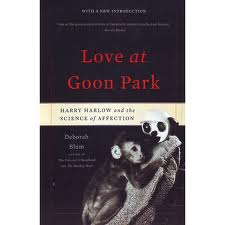Author(s): Deborah Blum
ISBN: 9780465026067
APA Style Citation
Blum, D. (2002) Love at Goon Park: Harry Harlow and the Science of Affection. New York: Perseus Publishing.
| openyourclassgoonpark_2.pdf |
Psychologist Harry Harlow challenged the notions of the 1950s regarding parenting and the power of attachment and love. From his humble beginnings as a bright yet odd child in Iowa, Harry found himself in disagreement over the zeitgeist of the field of Psychology early in his career. Famous psychologists such as John Watson in his book Children and Child Care promoted a parenting style, which strictly forbade the hugging and kissing of young children. Other Behaviorists agreed with this approach and parents who doted on their children were often accused on making their children “soft”. The events of WWII in London forced the evacuation of many children to the English countryside, placing them away from parents or caretakers. The results of this forcible removal suggested that children could be well provided for in terms of food and basic necessities, but a lack of parental love caused children to suffer both emotionally and developmentally. Investigations into “fostering homes” or orphanages (which were widespread during WWII) led to the same conclusion. Harlow was determined to challenge traditional notions on parenting and tested the importance of love and attachment. Harlow also wanted to test animals more like humans and get away from the Behaviorist habit of working only with rats. He conducted his research at the University of Wisconsin by providing young monkeys with artificial mothers.
The title of the book Love at Goon Park refers to Harlow studies of attachment and love and the address of the psychology building at the University of Wisconsin (600 N. Park Street) to which packages often appeared to be headed for “GOON Park”. Harlow demonstrated that “contact comfort” was more important than providing food to the young monkey as it helped to forge a strong bond between infant and mother. These monkey’s spent nearly all of their time with the “cloth” mother regardless of whether or not food was provided. They only went to the “wire” mother for food and quickly returned to the “cloth” mother. Those monkeys not provided any type of mother figure were unable to develop a strong attachment to a mother figure later in life and often became aggressive towards other monkeys. Harlow was far ahead of his time and his findings are supported by modern research (See the book review of How Children Succeed: Paul Tough) regarding the importance of attachment.
Harlow faced challenges in his own personal life, he was married three times and his first and third wife Clara (whom he married again after the death of his second wife) was a participant in the famous “termite” study in which Lewis Terman longitudinally studied gifted children. Harlow himself was not a very involved parent and spent nearly all of his time at the lab. He drank too much and ultimately succumbed to Parkinson’s disease.
The book discusses the shift from Behaviorism to a more Social Cognitive approach and discusses in detail to power and importance of attachment. In addition, his other research regarding isolation and community supports as well I.Q. tests with primates are detailed in the book. Harlow’s connection to other notable psychologists is fascinating, he studied under Lewis Terman at Stanford and mentored a young Abraham Maslow at Wisconsin, in addition to countless others.
Other Related Resources
Book Website
http://deborahblum.com/Love_at_Goon_Park.html
This American Life: Episode 317, Unconditional Love
This episode addresses the importance of attachment and the challenges families can face when attachment is not established at an early age.
http://www.thisamericanlife.org/radio-archives/episode/317/unconditional-love
Conquest Clip of Harlow’s Monkey
This clip shows Harlow’s lab and his original studies of monkeys.
http://www.youtube.com/watch?v=_O60TYAIgC4
PBS: A Science Odyssey
http://www.pbs.org/wgbh/aso/databank/entries/bhharl.html
Psychological Figures and Concepts
Mary Ainsworth
Gordon Allport
Alfred Binet
John Bowlby
Anna Freud
Sigmund Freud
G. Stanley Hall
Clark Hull
Wolfgang Kohler
Konrad Lorenz
Abraham Maslow
Ivan Pavlov
Martin Seligman
B.F. Skinner
Carol Tavris
Edward Thorndike
John Watson
Robert Yerkes
Attachment
Behaviorist Manifesto
Little Albert
Stanford-Binet test
Learned helplessness

 RSS Feed
RSS Feed